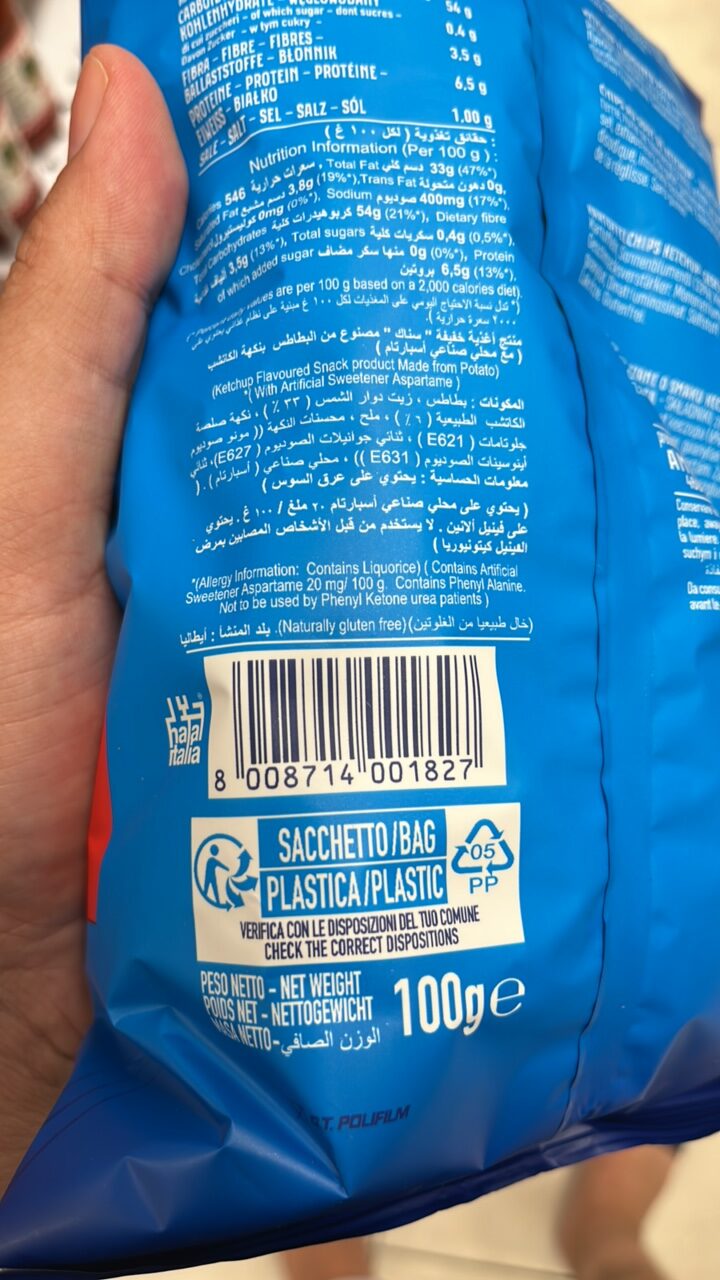
Barcode: 8008714001827
Ketchup Flavoured Snack
HALAL
📝 Reason: The product does not directly contain any clearly Haram ingredients or Haram E-codes (E120, E124, E354, E999) as specified. However, several ingredients such as ‘natural flavor,’ ‘flavor enhancers,’ ‘disodium guanylate,’ and ‘disodium inosinate’ can be derived from animal sources (which may be non-Halal or doubtful) unless Halal certification is present. As per Islamic dietary law (Quran 5:3) and guidance from IFANCA, unless the source is verified as Halal, ingredients of unknown or mixed sources should be considered Doubtful. Therefore, due to the presence of Status=2 (Doubtful) ingredients, the overall Halal_Result is 2 (Doubtful). Always confirm certification or source for such ingredients.
🏷️ Category: Chips, Snacks
📄 Certificates: Halal, 100Ge, Plastic/Plastic, Check The Correct Dispositions, Vegetarisch
Ingredients:
Details
Understanding the Halal Status of Ketchup Flavoured Snack
If you’re wondering about the Halal status of Ketchup Flavoured Snack, you’re not alone. As consumers become more conscious of their dietary choices, understanding which products adhere to Halal principles is essential. This product is categorized under Chips and Snacks and is presently labeled as Halal. However, let’s delve deeper into its ingredients and their respective Halal status.
Ingredients Breakdown
The main components of the Ketchup Flavoured Snack include:
- Potatoes
- Sunflower Oil
- Ketchup
- Natural Flavor
- Salt
- Flavor Enhancers
- Monosodium Glutamate
- Disodium Guanylate
- Disodium Inosinate
- Artificial Sweetener Aspartame
Assessing Each Ingredient
Here’s a closer look at the major ingredients and their Halal status:
1. Potatoes
Potatoes are a naturally plant-based food with no known issues regarding Halal compliance. They are universally accepted as Halal (Source: IFANCA).
2. Sunflower Oil
Sunflower oil is a vegetable-derived oil, and it is considered Halal. There are no animal-derived components in this oil (Source: Halal Food Authority).
3. Ketchup
Ketchup in its typical preparation includes tomatoes, vinegar, sugar, salt, and spices. As long as it doesn’t contain alcohol or Haram-based vinegar, it is Halal (Source: IFANCA).
4. Natural Flavor
‘Natural flavor’ can stem from either animal or plant sources; hence, unless explicitly noted as Halal, the status is considered doubtful (Source: Halal Consumer).
5. Salt
As a naturally occurring mineral, salt is universally recognized as Halal (Source: IFANCA).
6. Flavor Enhancers
This is a generic term that may include additives derived from animal sources. Due to the absence of clear labeling, the status remains doubtful (Source: Halal Food Authority).
7. Monosodium Glutamate (MSG)
Typically produced via fermentation using plant-based or bacterial sources, MSG is generally Halal unless it is derived from animal sources, which is rare (Source: Halal Haram).
8. Disodium Guanylate
This additive may originate from plant or animal sources including fish or yeast; thus, unless noted, it is deemed doubtful (Source: Halal Food Authority).
9. Disodium Inosinate
This substance is frequently derived from meat, fish, or yeast, rendering its Halal status doubtful without specific labeling (Source: IFANCA).
10. Artificial Sweetener Aspartame
Aspartame, which is synthetically created, is generally accepted as Halal unless processed using alcohol—a rare occurrence (Source: Halal Certification).
Conclusion: Is Ketchup Flavoured Snack Truly Halal?
Although the Ketchup Flavoured Snack is labeled as Halal, some ingredients such as ‘natural flavor,’ ‘flavor enhancers,’ and both disodium guanylate and disodium inosinate carry a doubtful Halal status. Always confirm the certification or source of these ingredients before consumption. It’s crucial for those adhering to Halal dietary guidelines to be aware of these complexities.
In summary, while the snack enjoys a Halal label, verification of ingredient sourcing is vital for ensuring compliance with Halal standards.
